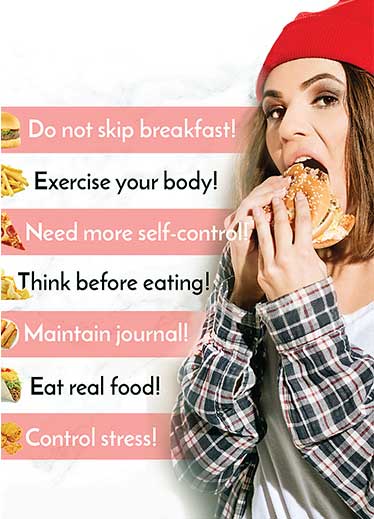Salt therapy – All you need to know
- 24 Feb - 01 Mar, 2024

I magine your favorite foods for a minute: pizza, french fries, steak, potato chips. Just thinking about them probably makes you hungry, right? Beyond providing us with the energy we need to live, food can be a big source of pleasure. It tastes good and has many aromas, textures, and other features that entice the senses. For some, food is also an emotional coping tool. You may overeat when you’re feeling stressed, sad, or worried. Unfortunately, overeating (even your favorite foods) can sabotage your health.
Here’s a look at why you’re probably overeating and how to be more mindful at mealtimes.
Have you ever wondered why you reach for food when you’re feeling a strong emotion? You’re not alone. There are many factors that shape eating habits, including anything from cultural norms to economic status to psychological issues. Many people eat when they are trying to cope with feelings.
Eating may initially help to ease stress or anxiety. After a while, though, overeating may lead to feelings of regret or guilt. It may even worsen the negative feelings it was meant to soothe. You may gain weight and deal with body image issues, leading to a cycle of – yes – more emotional eating.
Emotional eating may even lead to a more serious condition like binge eating disorder (BED) that involves eating very large amounts of food. You may feel completely out of control during a binge eating episode and unable to stop. It may feel like a strong compulsion.
Some people binge at special events, like holidays or birthdays. With BED, binging may start to happen more frequently and without any occasion at all. You may feel embarrassed about your eating habits and try again and again to stop.
Other symptoms of BED include:
• eating until you’re uncomfortably full
• eating in secret
• eating very large amounts of food in a set amount of time, like an hour
• frequent dieting with or without weight loss
BED is very difficult to overcome on your own. It may lead to obesity and related diseases like type 2 diabetes, heart disease, and gastroesophageal reflux disease.
Tips to stop overeating
The good news is that you can take some steps to stop overeating before it becomes a larger issue.
Keep a food diary so you can jot down how you’re feeling when you’re overeating. Are you sad, anxious, or bored? Write it down. Do you tend to grab a certain food when you’re overeating? Make notes on that as well. Once you start to see a pattern, you can work on replacing overeating with healthier coping mechanisms.
If you still feel like you need to eat, try taking it slowly. Your stomach actually takes about 20 minutes to communicate with your brain that you are full from eating. So, chew each mouthful several times. Take time to savor the flavors and textures in your meal. Once you’ve finished a meal or snack, take a break to see if you’re full before eating more.
If you’re especially hungry, you may be more likely to overeat. Many people skip breakfast, but eating early in the day may actually help you maintain a healthy weight and resist overeating. In fact, eating breakfast may increase the dopamine levels in your brain. Dopamine has the power to help control cravings and your impulse to overeat.
Reaching for healthier foods may ease overeating. When you eat processed foods, particularly simple carbohydrates, or other foods high in sugar, your blood sugar spikes and later crashes. As a result, you become ravenously hungry again. Processed foods include anything from candy bars to sugary breakfast cereal to pasta made with white flour. Try sticking with whole foods such as vegetables, fruits, nuts, whole grains (complex carbohydrates), fish, grass-fed meats, and healthy fats like olive oil.
When you’re tired, you may eat more than usual. In fact, a recent study shows that poor sleep is directly related to both increased stress and emotional eating in women. The women were given snacks in a laboratory and put under stressful conditions. Those who had slept well didn’t eat nearly as much as those who hadn’t had enough shut-eye. Aim to get between seven and eight hours of sleep each night.
Feeling like you can’t control yourself? Stay out of the pantry. Try replacing your overeating with another activity. Exercise is a great option that may even help to improve your body image. You may want to take a walk around the block, go jogging, or head to the gym to lift some weights. Aside from exercise, there are many other ways to control stress. Try meditation, yoga, or calling a good friend to chat.
If you’re still feeling out of control, you don’t have to struggle alone. It may be a good idea to contact your doctor, especially if you feel that you may be developing BED.
There are medications you can take for BED. These include antidepressants (selective serotonin reuptake inhibitors or SSRIs) and Topamax (topiramate), an anticonvulsant that may reduce binge eating episodes. Some people also benefit from behavioral weight loss programs.
COMMENTS